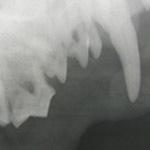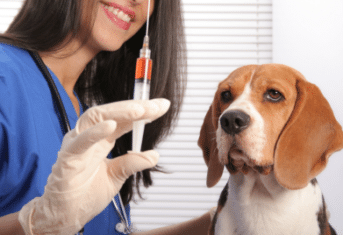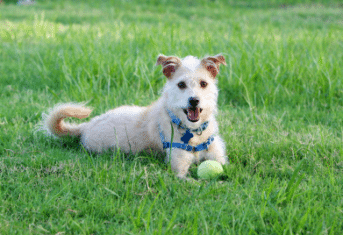February is Pet Dental Month: Part 1

February is Pet Dental Month: Part 1
The importance of dental care for dogs and cats.
Part 1 of a 3 part series by Stephen Riback, DVM
Like people, our pets are prone to dental disease. This month focuses on the importance of controlling and preventing dental disease in our cats and dogs. Untreated dental disease is associated with both infection and pain. Recent studies in people and dogs show that untreated infection in the mouth has also been linked to infections in other parts of their bodies.
Periodontal Disease
The most common disease in dogs is periodontal disease. It affects 85% of dogs over 5 years old and occurs in cats as well. Plaque and tartar accumulating on the tooth surface are full of bacteria that may cause a loss of attachment of the tooth to the supporting bone, gum tissue and periodontal ligaments. This attachment loss creates an increased space between the teeth and the gums that can harbor a more harmful bacteria. This space is called a periodontal pocket. It is the harmful bacteria or infection, living in this space that causes the halitosis or bad breath that we associate with periodontal disease.
Untreated periodontal disease causes progressive attachment loss and ultimately leads to chronic infections under the gum line. Dogs with untreated periodontal disease are prone to having their teeth fall out, they are prone to spontaneous jaw fractures, and they are more prone to diseases of other organs including the heart, lungs, kidneys and liver. The underlying periodontal disease can also be painful, but we tend not to notice our pet’s pain because it creeps up slowly over several years. As pet owners we tend to assume our pet slowing down is just part of the normal aging process. Many times, it’s the oral discomfort from dental disease causing the changes. If your pet has halitosis, or bad breath, periodontal disease should be considered. Red gums, bleeding gums, root exposure, gum recession and loose teeth may also be signs of advanced periodontal disease.
Diagnosis and treatment of periodontal disease requires general anesthesia. All patients should be prescreened to determine their ability to safely handle anesthesia. This includes a thorough examination, blood tests and sometimes other tests. Diagnosis is made by probing the periodontal tissues surrounding each tooth to look for evidence of bone loss and gum loss. Intra oral radiographs or X-Rays are also taken to evaluate the amount of bone loss present. Treatment for periodontal disease in our pets depends upon how advanced the disease is. Treatments include dental prophies (routine cleanings) for mild cases, medical or surgical therapies for moderate cases and extraction therapy for advanced cases. Many pet owners report that their pet seems happier or younger after successful treatment of periodontal disease.
Periodontal disease is often preventable through proper oral hygiene. This involves thorough home health care including brushing the teeth daily. Dental diets are also available for keeping the teeth cleaner. Dental sealants may be used to prevent plaque and tartar accumulation. There is a new periodontal vaccine that may be helpful in reducing bone loss associated with periodontal disease. Also, regular cleanings under general anesthesia are recommended to keep the teeth clean above and below the gum line.
If you notice halitosis, red gums, bleeding gums, loose teeth, discolored teeth or oral discomfort in your pet, you should be considering an oral evaluation for periodontal disease or other dental problems seen in dogs and cats. Our pets give us so much love. The least that we can do for our pets is help to maintain them with healthy, pain free, infection free mouths.
Reader's Poll:
[polldaddy poll="1346588"]
Be sure to check back for results!
———————-
About Stephen Riback, DVM
Dr. Riback received his veterinary degree from the New York State College of Veterinary Medicine at Cornell in 1985. He was a general practitioner from 1985 until 1999 and owned the Oakdale Veterinary Hospital from 1989 until 1999. Dr. Riback has worked at the AMC since 1999, first in the Community Medicine dept. and then from 2003 in the Dentistry dept. where he studied dentistry under the mentorship of Dr. Dan Carmichael, who is the only board certified veterinary dentist in New York City.
The department of dentistry is the only full service veterinary dental practice in New York City and operates Monday through Friday at the AMC. Dr. Carmichael works on Mondays and Dr. Riback is in Tuesday through Friday. Dental procedures and oral surgeries are performed Monday through Friday.


































